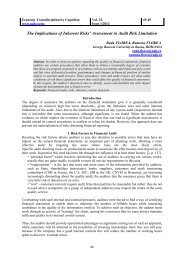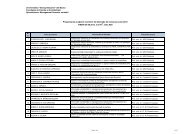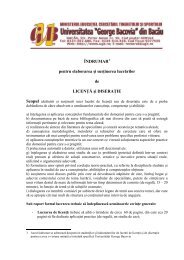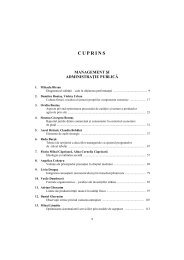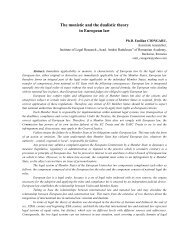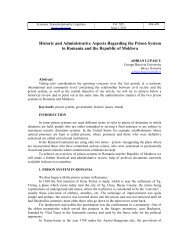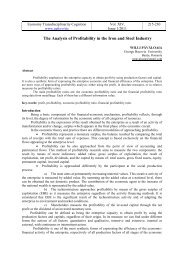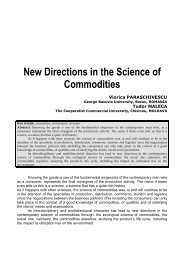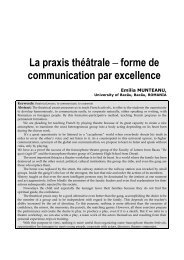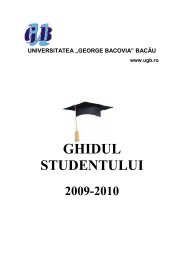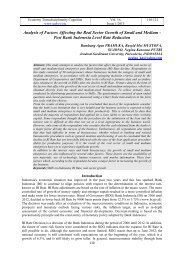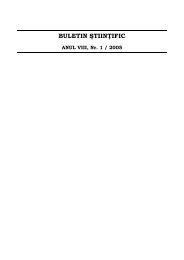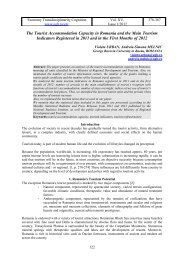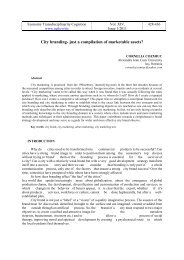BULETIN ÄTIIN IFIC - Universitatea George Bacovia
BULETIN ÄTIIN IFIC - Universitatea George Bacovia
BULETIN ÄTIIN IFIC - Universitatea George Bacovia
You also want an ePaper? Increase the reach of your titles
YUMPU automatically turns print PDFs into web optimized ePapers that Google loves.
Advantages and disadvantages of face-to-face business communication 67<br />
e.g. “This aspect cannot be discussed but with the general manager.”<br />
f) Aggressive language<br />
e.g. “I have never heard such a stupid thing!”<br />
When speaking about negotiation we should also take into consideration the speech acts.<br />
The study of speech acts, as a subset of pragmatics, centres on the way languages<br />
accomplishes communication goals through the act of speaking. Specifically, actions such as<br />
promising, requesting, warning, asserting and apologizing are performed through conventions of<br />
expression. Thus utterances such as threats, promises and commitment statements in<br />
negotiation are types of speech acts. The specialists Walton and McKersie recognised this link<br />
between language and tactics in their distinction between flexible and firm commitments. An<br />
utterance of a firm commitment specifies parameters, sets up imperatives and follows a simple<br />
declarative sentence, for instance, “We insist on no less than 7% in salary increment!”<br />
Flexible commitment statements, in turn, employ qualifiers, state requests indirectly and<br />
lumps issues into vague categories, for example, “These subsidiary items are important to us.”<br />
There has also been studied the use of literary tropes (such as metaphor, irony,<br />
metonymy and synecdoche) in negotiation.<br />
Let’s take, for instance metonymy that is a figure of speech in which the whole stands for<br />
its constituent parts. A good example is the term “culture” which in organizational studies is not<br />
only a metaphor, but is often used as a metonymy for an organization’s values, rituals and<br />
myths. The whole of culture refers to and embodies its various symbol systems.<br />
Synecdoche refers to the use of words that treat the part for the whole or vice versa, for<br />
example, using the terms “crown” or “throne” to stand for the “king” or “queen”. Synecdoche,<br />
then, operates from the view of representation. For example, the use of such words as<br />
“hierarchy” or “bureaucracy” to represent to entire organization exemplifies synecdoche. Watson<br />
reports on the use of synecdoche in his study “Rhetoric, discourse and argument in<br />
organizational sense making: A reflexive tale" 6 , in the use of the words “stake in the<br />
organization” to represent a shared sense of community and good character and “take out<br />
heads” to represent how the company reduces employees, respectively.<br />
The concepts of metonymy and synecdoche capture the cryptic nature of language use<br />
through the ways that words become shorthand expressions for past discussions, incidents and<br />
shared experiences.<br />
Irony is a rhetorical device used especially the distributive negotiation while the use of<br />
metaphor is extended to the entire field of business relationships.<br />
<br />
<br />
<br />
Bibliography<br />
Bazerman, M.H., Lewicki, R.J. (1983): Negotiation in organizations, Beverly Hills, CA: Sage.<br />
Chiriacescu, Adriana (2003): Comunicare Interuman. Comunicare în afaceri. Negociere, Bucureti,Editura ASE.<br />
Dupont, Ch. (1990): La négotiation, conduite, théorie, applications, Dallez.<br />
Lewicki, R.J., Saunders, D.M., Litterer, J.A. (1999): Negotiation, IL: Richard D Irwin, Homewood.<br />
Rubin, J.Z. Brown, B.R. (1975): The social psychology of bargaining and negotiation, New York, Academic Press.<br />
Watson, T.J. (1995): Rhetoric, discourse and argument in organizational sense making: A reflexive tale,<br />
Organizational Studies, 16/5.<br />
6 Watson, T.J. (1995): Rhetoric, discourse and argument in organizational sense making: A reflexive tale,<br />
Organizational Studies, 16/5.



